If you follow me closely, you know that I’ve been discussing romance scams (also known as “catfishing”) for several years now. In short, a romance scam is where criminals will harvest photos from social media and dating site profiles and then use these photos to set up fake profiles on these same sites to enter into online relationships with individuals for the purpose of defrauding victims out of money. A more technical definition of the term romance scam is provided below.
A romance scam is a confidence trick involving feigned romantic intentions towards a victim, gaining their affection, and then using that goodwill to commit fraud. Fraudulent acts may involve access to the victims’ money, bank accounts,credit cards, passports, e-mail accounts, or national identification numbers or by getting the victims to commit financial fraud on their behalf. (Wikipedia)
For at least eight years, scammers have been using my photos, and the photos of my family, to commit these crimes. I hear from new victims on a daily basis as they frequently find the “real” me through my previous writings on the topic. Unfortunately, many victims find out too late, often after they have already sent significant amounts of money to these scammers and/or have developed a significant emotional attachment. These are deeply complex crimes that rely on a victim’s capacity for love, trust, and good will for the execution of fraud.
Today, I read a victim’s report on a Facebook group that is dedicated to raising awareness of these scammers. The post is worth the read in itself as it highlights some of the tactics used in these cases. Relevant in this case is that the victim pointed to several social media profiles that were created with my photos and the photos of my family. I’ve included screenshots of these fake profiles below with some added context.
First, there is the fake profile using my photos and the name Alex Gallart. The use of a similar first name is notable as past victims have told me that once they found my real identity they would approach the scammers with evidence of me actually being “Alec Couros”. In turn, the scammers would simply say that they use slightly different names or surnames for whatever purpose (e.g., mother’s name, professional name, etc.). In many cases, this additional lie seems to be taken up as plausible.
Then there’s photos of my real brother George whose fake name is John Williams in this case. Scammers will set up networks of fake profiles and communicate to victims from each of these to validate the key profile’s identity.
Then, why not throw in photos of my real daughter as well? In this case, the scammers use the fake name of Clara Gallant to set up yet another profile. Alec Gallart seems to be more authentic with each additional connection.
Wait. Not real enough for you? How about we add photos of my real mother in yet another fake profile. As we know, grandmas will never lie to you.
But I guess that wasn’t enough. A family’s set of fake profiles is pretty convincing, but the scammers felt that they needed to go the extra mile to make Alec Gallart even more convincing. The scamers thought it would be great to exploit my father’s death (he passed away in 2013) by including this photo of my children at his burial mound.
And they also included this photo of my mother remembering my father’s death via Facebook.
So there you go. The more complex the social network becomes, the more convincing the scam will be.
So, this is where I need your help. This happens to me every single day. But it’s not just happening to me. It’s also happening to thousands of others on a daily basis. But, Facebook and other social networks just simply do not acknowledge that this problem exists. For instance, there is no specific way to report these accounts as romance scammers in Facebook’s reporting tool. In fact, as you can see by my friend Alan’s experience, these fake accounts will often be deemed as following Facebook’s community standards!
Back in August, Facebook announced 1 billion daily users. I am sure that number pleases their investor’s but I wonder how valid that claim is considering I’ve personally reported many hundreds of fake accounts and there are logically thousands more that I do not know of. Multiply my reality by the thousands of other people’s profile photos that are being used and I begin to feel that Facebook is intentionally not addressing this reality due to their significance.
But even if these accounts don’t really put a dint into the one billion user reality, there are serious implications here for the identities and well being of their current and future users. A social media site needs to feel safe if one is to connect, share, and communicate with other users, especially with those that we do not know so well. Facebook needs to do something about this problem, but I am convinced that they won’t act unless there is some heat on this issue.
So please, share this post widely. I want Facebook to acknowledge this problem. But more so, I want this issue to get to someone at Facebook that can help address this problem through the revamp of their reporting service and through a number of possible mechanisms to detect the scammers before they can hurt people. I’ve got ideas on how this can be done, but I need to be connected to someone who can address these changes.
If you want to know more about these romance scams, I’ve written several other posts and created several Youtube screencasts. See below. And, thanks for any help you can provide.
The Real Alec Couros

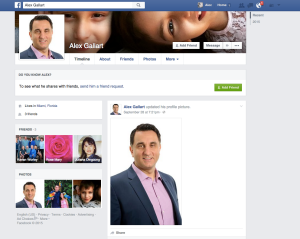
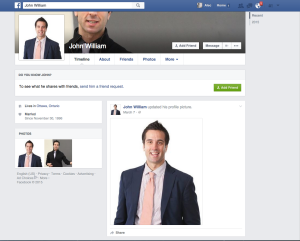
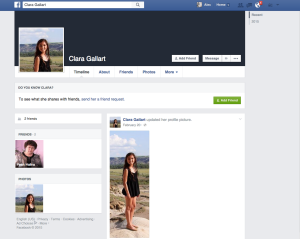
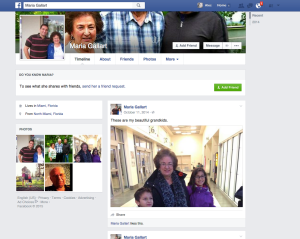
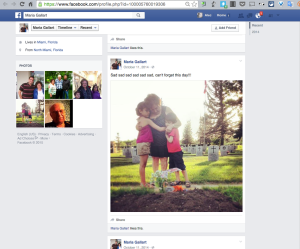
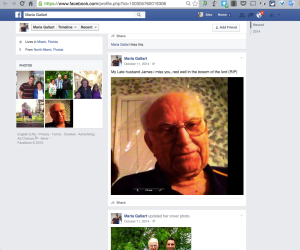
This is realy interesting but I can’t help but wonder why your photos weren’t posted privately which would have prevented this from happening in the first place.
Hi Jenny,
I don’t follow you on Facebook but I just searched you there and found that your profile is quite public to the world. There are dozens of photos of you including those with children. Should I ask the same of you in terms of why you don’t keep these public?
But, I wouldn’t ask that question of you because I think that it should be your right to post your photos publicly and with that, there should be an expectation that our photos won’t be used without our permission, and certainly not against us.
We need to address this problem rather than to victim blame. Now, in the future I may adjust the way I share photos, but at this point the horse has left the barn and I’d like to work on a solution for the millions of others, like you, who have posted many of their photos publicly to the web.
As with other cases of “victim blaming” and “victim shaming,” WE shouldn’t be the ones who have to adjust our behavior in fear of criminals. Sure – take sensible precautions. But as my dad always said, “Locks are only there to keep honest people honest.” They rarely stop a determined thief. The best defense, I’ve found, is to be visible enough and vulnerable enough that people who know you at all would laugh in the scammer’s face, challenge them, and report them immediately. Be inimitable. ;) Also implement dual authentication on your accounts whenever possible; post MOST pics “Friends only”; be open to new connections but challenge any that are based on “mutual friends” only – not all of our mutual friends are wise in the connections THEY accept. Really, we’re all just one cup of coffee or one slip of a finger away from making a mistake. Facebook needs to step up its game and help curb this behavior, too.
The most recent one I have in my inbox clearly stems from an impersonation scam. I don’t publicly describe all the “tells” anymore (most are still stupid enough to show them). But a LOT of folks fell for it and now there’s an account with over 2000 “Friends” (different account, but I’m reasonably sure it all stems from the first impersonation, where they culled contacts and mutual friends). This new account now shows high numbers of mutuals and people keep falling for it. It’s not a “lonely hearts” scam, either. I’m still not quite sure what their game is, but right now, some as-yet-unnamed vanity press is looking good for it, based on the targeted communities… :)
Oh, wait! LOL – I was only slightly off – “as-yet-unnamed vanity press” appears to be a hosting company in the UK targeting writers, poets, and artists. I was close – do I get a cookie?
I absolutely agree with your comments. In particular, the friending of those who we don’t know by a single person can set off an entire network effect of trust. I remember tweeting this for instance on the same phenomena. https://twitter.com/courosa/status/606271401293537280
When I see a friend recommendation from Facebook, I see who we have in common and it’s almost always the same people who follow every friend request and haven’t been alerted (or haven’t considered) these implications.
Take down its wrong thing to do.Is throw your pictures. to public.Just plain stupid.If you were someone like actor,singer,wrestler.Such people like that but just teacher.I never knew who u were until all this bullshit came about.Being professor is not none of the above.Its not hard to find address or phone number on anybody.Not like pulling millions basket ball player or football player were there publicized all the time.People need wake up and realize how dangerous the internet has become.And still don’t know u.Cause never did any further search.Not intrested to know anything less I know the better of since I’am being attacked online by your assistance Katia.I mind my business and keep to myself.I’am social person.I like to talk all walks of life because I learn alot by talking to different people from different countries.
This can happen to anyone anytime. Photos can be taken from anyone, anywhere . We may not be the one posting photos. No matter if we did. Photos easily copied, easily shared, easily misused. Security settings are supposed to matter, but they don’t. I am so sorry this is happening to you , your family and others and I will try to do my best to help . This can happen to you in one form or another. Don’t be fooled. It is never OK. All of us who care about digital citizenship and each other should repost!
I reported one to Facebook as early as this week. Same old story, wife fooled around with his best friend, one parent died in a car accident, one of cancer, no siblings. Looking for a good woman to help raise his son. Leaving town in a couple of weeks but proclaiming his undying love for me, after only a couple of days and he needed my phone # to communicate with me while away from the country. Unfortunately when I reported him, Facebook investigated and decided he was doing nothing wrong!
Yes, that’s the real problem. I typically report these and I get the message that says these scammers are following community standards (see Alan’s post above). Then, I usually report it again where it says “let us know” and *usually* it is taken down. This could be fixed if Facebook had an improved reporting structure.
I have no faith in Facebook “caring” about how their platform is being used for good or ill. In fact, I find FB and its algorithms the creepiest of the social networks in which I participate. I don’t know if the screenshots you posted show everything, but to me those look pretty fake with only a few friends and the fake mom being the only like on her “sad” post. It is like the email phishing scams where something just looks off. We need to apply (and teach) critical thinking, especially when someone we have never met in the flesh wants us to send money!! I have sent money to some of the online campaigns that people set up to help with expensive medical care. Those could conceivably be scams as well. Although I am usually led to those sites through someone I know personally, I have occasionally sent money to people I’ve found through social media “friends.” However, I make sure to give in increments I can well afford. I don’t become emotionally attached to these people and, if I did find out I was scammed, I would be disappointed but not devastated.
Even in the post you shared, from the woman who was scammed, there seemed to be some signs that might have nipped the thing in the bud. She already knew there were scammers out there! Good that she did not send money and that she alerted others.
I’ve always admired your commitment to online openness, and think it serves the greater good that, with your influence, you are bringing awareness to this problem. That said, it must feel very uncomfortable to see your personal life used by scammers.
It would be nice to see Facebook take up the cause.
To add to your comment, I do believe that while many of the signs are obvious to us (those with more experience on the web, more digitally fluent), that they are certainly not as obvious to others. Plus, many of the victims that I encounter are just out of relationship for the first time and they find themselves (typically middle-aged women) with little experience to deal with online dating for the first time in their lives. Plus, those who have never been scammed before can certainly see the world and the Internet through rose-coloured glasses. We know the signs because we’ve seen the good and the bad. We can’t expect that type of literacy and experience from others. I think you were saying this as well but I wanted to make the point quite clear.
Thanks for comment. Great to hear from you.
Andrea, I completely agree that Facebook and its algorithms are the creepiest of the social networks. If Google’s motto is “Don’t Be Evil,” Facebook’s would be, “Whatever it takes.” Whatever it takes, that is, to build a network of eyeballs and consumers no matter who they are or what they are using their platform for.
-Facebook’s security changes are always made in their favor over yours
-to make the changes back to a more secure setting, you are often forced to go through settings in a counterintuitive way (in a website that is normally very easy to navigate)
-Facebook has a long record of being ruthless in getting control of user photos
…I could go on and on.
It’s a bit like getting off an airplane and entering a place where there are scammers and criminals everywhere, the government has tons of money, but the police are indifferent and can’t even be bribed. But somewhere out there are a few of your friends and family members that you want to connect with.
Alec, I will share this post. As usual, I am disgusted with Facebook’s approach and world view.
thank you so much i see you are on google plus now so it leaves me with a smile there is so many strange people why do the the use others photos and then the break people i know i was there but i was lucky i get to live some will not and some loose everything they have no heart nor soul cause we don’t do this to others but then again it is all about the money they can make that is all and man and woman fall for this
i read what you said i knew that is true for i try to protect my photos and friends but if these people take hold of you they go big they destroy your life with in a few days and i know what i am talking about it happen to me and yes i lost money but it is the way they make you feel and what happens to you after they have left but still so many fall for it so i try to tell all for the use the same photo over and over so when i see it and i see woman comment on it i write to them and tell about the photo and i have reported one of them to for i had to find that the real identity of the photo is doing it himself using his children so now i got all my friends across the world to put his things up and i have reported him to FBI and contacted his work and maybe it was just my luck or much more but i got mail from his boss and he was very helpful but the feeling they leave you with no one can make it better just time and a lot of it
o just before i go I have you Alec Courosa on goolge plus under another name thank goodness i use google image search to find out before i accept anyone
there is a guy called Freddy Ngebi in south africa using your pictures and scamming people via senior dating agency
Such an awful situation to be in.I just wish facebook would be more sensitive to this issues and protect its users.
Thanks Alec Couros for your response.